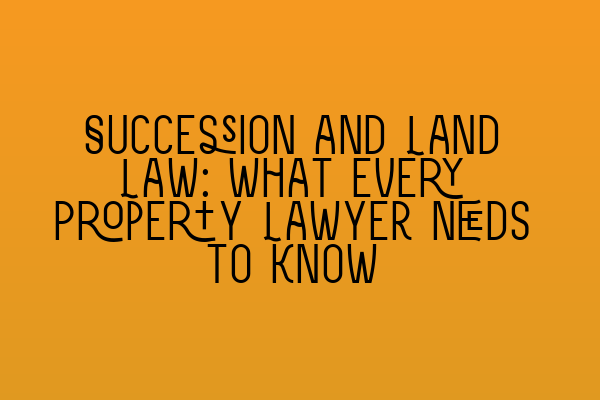Succession and Land Law: What Every Property Lawyer Needs to Know
Succession and land law play crucial roles in the realm of property law. As a property lawyer, it is essential to have a comprehensive understanding of these areas to effectively advise your clients and navigate the complexities of property transactions. In this article, we will delve into the key aspects of succession and land law that every property lawyer should be familiar with.
Succession Law: Protecting the Rights of Heirs
Succession law governs the transfer of property upon the death of an individual. It ensures that the deceased’s assets are distributed according to their wishes or applicable laws. Understanding succession law is crucial for property lawyers as they often deal with matters related to wills, estates, and probate.
One important aspect of succession law is testamentary capacity. Testators must have the mental capacity to understand the nature of their will, the extent of their property, and the impact of their decisions. Misrepresentation in wills can result in legal disputes and challenges, so property lawyers must be diligent in assessing their clients’ testamentary capacity.
Additionally, property lawyers must be familiar with the formalities of making a valid will. These include the requirement for the will to be in writing, signed by the testator, and witnessed by at least two individuals. Failure to meet these formalities can render a will invalid and lead to uncertainties in the distribution of assets.
For a more in-depth understanding of misrepresentation in contracts, be sure to check out our related article: Misrepresentation in Contracts: Unveiling Deceptive Practices.
Land Law: Navigating Property Rights and Transactions
Land law encompasses various legal principles and rules that govern the ownership, use, and transfer of land. Property lawyers must have a sound knowledge of land law to advise clients on matters such as buying and selling property, land disputes, and leases.
One fundamental concept in land law is the distinction between legal and equitable interests in land. Legal interests are enforceable rights recognized by law, such as freehold or leasehold ownership. Equitable interests, on the other hand, arise from equitable principles and may not be recognized in the same way as legal interests. Understanding this distinction is essential in protecting clients’ rights and interests.
Another important aspect of land law is the principle of adverse possession. Adverse possession allows a person who has occupied a piece of land for a certain period of time without the owner’s permission to claim legal ownership. Property lawyers should be well-versed in the requirements and implications of adverse possession to guide their clients accordingly.
To gain a deeper insight into the SQE Contract Law syllabus, we recommend reading our related article: A Closer Look at SQE Contract Law Syllabus.
Succession and Land Law in Practice: Putting Knowledge into Action
As a property lawyer, it is crucial to apply your knowledge of succession and land law in real-life scenarios. This includes drafting wills and advising clients on estate planning, managing property transactions, and resolving disputes related to property ownership.
When dealing with property transactions, it is essential to carry out thorough due diligence to uncover any potential issues or encumbrances on the property. This includes examining title deeds, conducting searches, and investigating any third-party claims. By doing so, property lawyers can ensure that their clients have a clear and marketable title to the property in question.
For a comprehensive review of landmark cases and influential judicial decisions in SQE Contract Law, take a look at our related article: SQE Contract Law: Analyzing Landmark Cases and Influential Judicial Decisions.
The Importance of Continued Learning and Testing Your Knowledge
Property law is a dynamic field that evolves alongside legal developments and societal changes. As a property lawyer, it is crucial to stay updated with the latest legal precedents, legislation, and industry practices.
Furthermore, regularly testing your knowledge and refining your skills is essential in ensuring that you provide the best possible advice and service to your clients. We offer interactive mock tests for Contract Law to help you assess your knowledge and identify areas for improvement. Check out our related article for more information: Interactive SQE Mock Tests for Contract Law: Test Your Knowledge.
Conclusion
Succession and land law are integral components of property law, and a solid understanding of these areas is vital for property lawyers. By familiarizing yourself with testamentary capacity, formalities of making a will, legal and equitable interests in land, adverse possession, and the practical application of these principles, you can navigate property transactions, advise clients effectively, and mitigate potential disputes.
At SQE Property Law & Land Law, we are committed to providing the best resources and support for aspiring property lawyers. We encourage you to explore our related articles to further enhance your understanding of key topics in property law.
